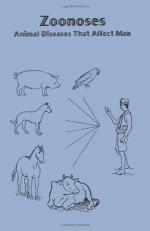|
This section contains 575 words (approx. 2 pages at 300 words per page) |

|
Zoonoses are diseases of microbiological origin that can be transmitted from animals to people. The causes of the diseases can be bacteria, viruses, parasites, and fungi.
Zoonoses are relevant for humans because of their species-jumping ability. Because many of the causative microbial agents are resident in domestic animals and birds, agricultural workers and those in food processing plants are at risk. From a research standpoint, zoonotic diseases are interesting as they result from organisms that can live in a host innocuously while producing disease upon entry into a different host environment.
Humans can develop zoonotic diseases in different ways, depending upon the microorganism. Entry through a cut in the skin can occur with some bacteria. Inhalation of bacteria, viruses, and fungi is also a common method of transmission. As well, the ingestion of improperly cooked food or inadequately treated water that has been contaminated with the fecal material...
|
This section contains 575 words (approx. 2 pages at 300 words per page) |

|


